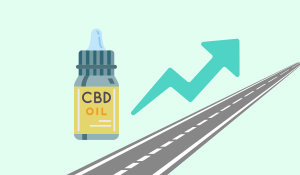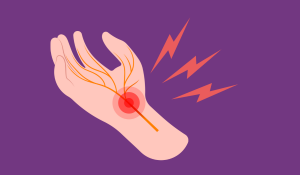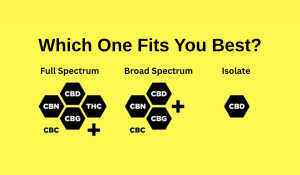Chronic pain affects millions and often limits everyday activities. CBD, a non-intoxicating compound from hemp, is emerging as a natural option for pain relief — without the side effects of opioids or NSAIDs.
CBD interacts with your endocannabinoid system (ECS) — a network of receptors (CB1 & CB2), endocannabinoids, and enzymes that help regulate:
Learn more about the endocannabinoid system in our CBD 101 guide.
Persistent pain (e.g., fibromyalgia, joint degeneration) may be eased by CBD’s anti-inflammatory and nerve-calming properties. Explore CBD’s role in treating neuropathic pain today.
CBD may reduce swelling and stiffness. Research shows CBD topicals for arthritis pain can calm joint inflammation.
CBD may relieve muscle strain and inflammation near the spine, improving comfort and movement.
Often described as burning or tingling, nerve pain may respond to CBD by modulating pain signals in the nervous system.
CBD Oil (Tinctures): Systemic relief — fast absorption under the tongue
Topicals (Creams, Balms): Local pain — direct application to sore areas
Capsules & Edibles: Consistent dosing — slower onset, longer effects
Vape: Fast relief — not recommended for everyone
For guidance on accurate dosing, use our CBD Oil Dosage Calculator.
Start low and slow — increase gradually until you find relief. Dosage depends on body weight, pain severity, and product type. Always consult your doctor, especially if you’re on medications like blood thinners.
CBD: Non-psychoactive, widely legal, no high — great for pain and inflammation.
THC: Psychoactive, regulated differently, may provide pain relief but comes with legal and cognitive concerns.
Learn more about full vs broad-spectrum CBD if THC sensitivity is a concern.
Most users tolerate CBD well. Potential side effects include:
Choose high-quality, lab-tested products and monitor how your body responds.
CBD works best as part of a holistic plan. Consider combining it with:
Will CBD show up on a drug test?
Only if the product contains THC. Choose THC-free options to be safe.
How fast does CBD work for pain?
Sublingual oil: 15–45 mins; Edibles: 1–2 hours. Effects improve with consistent use.
What’s the best CBD for pain?
Topicals for targeted relief; oils or capsules for whole-body pain.
Can I mix CBD with pain meds?
Talk to your doctor — especially if taking prescription painkillers.
Early research supports CBD’s role in reducing inflammation, nerve pain, and improving sleep in chronic pain sufferers. However, more human trials are needed for conclusive evidence.
CBD offers a promising, natural alternative for managing pain — whether it’s daily joint discomfort or nerve irritation. Start slow, choose quality products, and consult your healthcare provider. Relief might be closer than you think.

Explore this cbd consumption methods tutorial and follow the step-by-step process to select, use, and verify the safest ways to consume CBD for wellness.
Read More
Learn what CBD edibles are, their main types, expected effects, legal status, safety factors, and how they compare to other forms of CBD.
Read More
Therapeutic Uses of CBD Managing Chronic Pain with CBD Struggling with chronic pain? CBD might help. Studies suggest it can reduce inflammation and alleviate discomfort,...
Read More
Just as CBD may help humans due to its interaction with the body’s endocannabinoid system, the same is true of dogs. CBD has the potential...
Read More
Cannabis has been used for millennia to treat numerous health conditions. Current research offers promising results on the effects of CBD oil on breast cancer.
Read More
What Is CBD for Cats? CBD (Cannabidiol) is a natural compound from hemp. It’s non-psychoactive, meaning your cat won’t get “high.” Instead, it works with...
Read More
1. Understanding Neuropathic Pain Neuropathic pain results from nerve damage or dysfunction, causing symptoms like burning, tingling, or sharp shooting pains. Common Causes: Symptoms Include:...
Read More
CBD for Pets: A Pet Parent’s Guide to Dosage We all want the best for our pets, especially when they’re struggling with pain, anxiety, or...
Read More
What Is Lupus? Lupus is a long-term autoimmune condition that can impact multiple organs, including the skin, heart, lungs, and kidneys. The most common type...
Read More
1. Full-Spectrum CBD: The All-In-One Option What it is: Contains CBD, minor cannabinoids, terpenes, flavonoids — and less than 0.3% THC. Why choose it: Promotes...
Read More